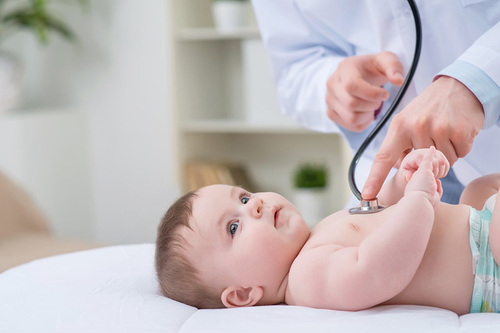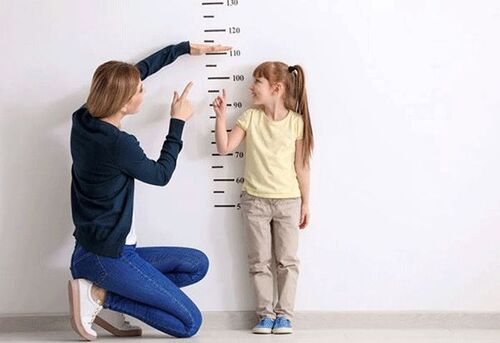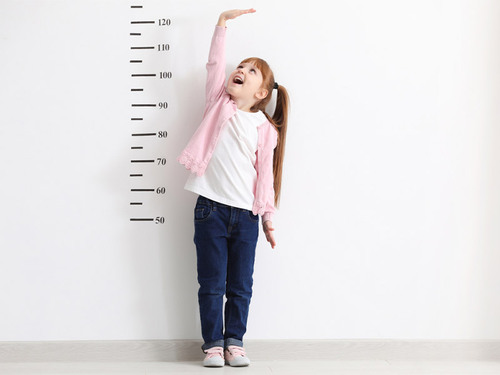The child's development begins from the first day after they are born and it can be seen every day. A child's development varies from one child to another depending on the children themselves and the way they are cared for and treated. Every child's development includes their "body and brain" development. If any of these aspects do not develop properly, it means that the child is not developing properly. Deficiencies in vitamins, chronic diseases, malnutrition, and osteoporosis affect the development of the child.

Children's development can be divided into two parts:
First: The development of the body which means their height and weight.
Second: The development of the "brain" consists of the actions that a child must do at a certain time of age. The development of a child varies from child to child even from one family to another because each person's characteristics are related to the genetics that remain from their parents for them.
Parents should take the child to the doctor at least every three months in the first year which means three to four times so that the doctor could visit them and put the child's health information on the chart and measure their weight and height. This helps us to know the child is growing normally and it also helps prevent any health problems in the child's development process.

What are the stages of a child's development?
The first year of a child's growth goes through several stages and begins to develop both physically and mentally. We can call the first year of a child's development a basic stage of the child's development. These stages are:
1. Smiling: two months old
It's a purposeful smile when the child sees your face and hears your voice.
2. Laughing: four months old
It is at this stage when you can hear the sweetest voice, the voice of your baby's laugh. From now on the child laughs more and cries less.
3. More peaceful sleep: six months old
From this age, the child learns to sleep peacefully at night and allows his or her mother to spend a quieter night.
4. Sitting down: eight months old
From this age, you will not see your child lie down all the time because they can sit down properly.
5. Crawling: nine months old
Most babies start crawling by the age of nine months old using their hands and legs, however, a small number of children never crawl and they begin walking immediately.
6. Waving bye-bye: from nine to ten months old
Waving goodbye with those little hands is not a simple task to do. It means that the child has reached a stage where they can realize a link between voice, sign, and meaning.
7. Eating: from nine to twelve months old
Now the child can control their hands' movements more easily. They can hold small objects with their hands and move them towards their mouth. Due to this new phase of learning, they put everything in their mouth so it is very important to keep them away from risky and dangerous objects.
8. Walking: twelve months
The children begin to stand upright from the age of twelve months and they can stand for a short while. If they touch a wall or something similar, they will be able to walk a few steps.
9. Stepping: thirteen months old
Nothing is more beautiful than seeing your child taking their first steps. The average age for the children to start walking is thirteen months old but it is also normal if they do this from the age of nine months to seventeen months old.
10. Learning words:
At the beginning of the age of one, they can say a word or more correctly like "dada, mama, nana" and they also try to imitate the adults' talking.

Factors that affect the children's development
First, "when the mother is pregnant" they need to visit the doctor regularly to keep their diet in control and stay healthy during this time. After childbirth, the best food and drink for the child is their mother's breast milk. Breast milk is sufficient until the baby reaches six months old. After six months, the parents realize that no matter how much the milk is, it is not enough for the baby thus, they need to give the child other food too. Sometimes, vitamin deficiencies and malnutrition that happen for a baby or the chronic diseases of kidney, intestine or diabetes, and osteoporosis and iron deficiency can affect the child's development.
Second, after the age of six months, it is better to give the child food as well as breast milk. It is important to choose healthy food enriched with vitamins. At first, it is better to give the child small portions of food for three days to see if the child is not allergic to any kind of food. Some kinds of food can have a positive impact on the child's development like vitamins, iron, and some protein sources that are necessary for the children's development, a special kind of salt is also necessary for the body's vitality. These are among the kinds of food that can impact children's mental and physical development.
Third, "sleeping" is one of the main developmental fundamentals that directly affects the development of a child, and the hormones responsible for growth are more active during the time of sleep. The best time for the children to sleep is between 8 pm to 6 am, this time is very helpful for the child's development if they go to sleep thus, parents need to put their children to sleep at this time. Parents need to avoid using sleep drops or syrups for their children because they can have a negative impact on their children's mental growth.

What are the foods beneficial for the children's development?
Just like eating is important for the child's development, the mother also should breastfeed her baby for six months to two years. After the age of six months, the mothers should prepare a list of foods that are very essential for their babies.
Bananas: Due to its high energy content, it helps the child to gain weight and it is rich in fiber, potassium, vitamins, and minerals.
Avocado: It is one of the most beneficial fruits for the child's development and their weight gain.
Sweet potatoes: It contains a very low level of fat, it is rich in "fiber, magnesium, potassium, vitamin B6, and a lot of vitamin A and C" which are all vital for the children's growth.
Cheese: It is considered to be a beneficial fat. It helps the children grow and it also is anti-inflammation. It can help the body's immune system strengthen.









